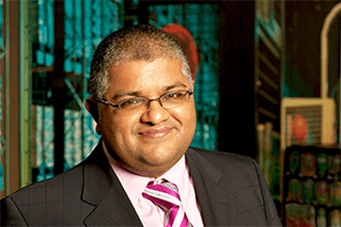It was a pleasure to sit down with Rupen Shah, who describes himself as British Kenyan Indian who comes from humble roots. Rupen freely disclosed that he has been incredibly fortunate to be afforded opportunities and to have the support of people who believed in his potential, enabling him achieve more than he realised he was capable of at the time. The personal benefits Rupen accrued from his career now afforded him choices in life and because of his roots, he has a strong desire to give back and dedicate a significant proportion of his time to not for profit and social impact businesses.
Rupen holds an impressive career history and he is currently a Senior Advisor to Wellers Impact, where he works with the boards and the leadership of SME investments, guiding them to accelerate their development making them more attractive entities for responsible lenders and investors as they grow. Through Weller's partnership with Water Unite, Rupen has been advising on how we can further develop the Water Unite programme. He is also a board member of Alquity Investment Management (an ESG Asset Manager), a board advisor to Upbeat Brands and a Trustee of Transforming Lives Foundation.
Rupen’s executive career started with 20 fantastic years at Britvic Soft Drinks where he worked across senior leadership roles in finance, investor relations, sales and strategy. His last executive role was as CFO at Motability - a unique collaboration between government, private enterprise and charity, operating the largest leasing vehicle company in Europe, providing mobility to people with disability.
Given your experience of working across consumer goods, how important do you think sustainability issues are for brand owners and retailers?
Very simply, sustainability for brands, be it products or retailers, has become a sales driver and today there is a first-mover competitive advantage for those that get it right. Consider that 84% of all consumers around the globe today understand they need to change their purchasing behaviour to address our climate emergency and environmental challenges.
At Water Unite we worked with the global research consultancy, Kantar, to understand how consumers are on the journey of changing their shopping habits. To name some of the statistics that came out of this project, Eco- Actives (consumers who are very driven by ESG issues) and Eco-Considers (those who want to change more than they are doing so) comprise 60% of the global consumer market spend which increased 9% from the previous year. This is staggeringly positive for our future. From the large range of issues, Eco-Actives and Eco-Considers are most concerned about climate change, plastic waste, water pollution and water shortage. It is Important to note these concerns are global and not just local to them – they care about the supply chains of the product they consume.
The challenge and opportunity for brands and retailers are that only 22% of shoppers can name one brand that genuinely cares for the environment and 30% of shoppers are unsure how to adjust their purchases to be environmentally friendly – this will change and as a consequence, some brands will change and win and some will no longer exist as they no longer exhibit the values of their previous consumers.
COVID-19 has enabled a generation of consumers to become more active in their concerns; the global pandemic has highlighted supply chain issues that are linked to negative environmental impacts. Brands and retailers will need to show consumers they are taking the planet seriously with authentic action that will win share of wallet and those that lead the movement will create a competitive advantage.
How do you see the Water Unite brand proposition support our partners with this? I would say there are three core elements to this.
First, sustainability programmes need to make good commercial business sense to be sustainable. The Water Unite programmes help brands grow sales. Undeniably the closer a product or retail brand aligns its values to those of its consumers, it drives penetration, loyalty and grows a higher proportion of consumer spending. A personal example – I am a big soft drink consumer and I will always be; however, my brand choice is now also influenced by those brands that are making a bigger contribution to the environment and planet rather than traditionally just preferred brand, price and availability. My teenage son is even more discerning on these matters than I.
Secondly, simple solutions work best! The program we offer enables our partners to influence those shoppers more aware of the need to be sustainable by offering a mechanism for them to act to offset their beliefs. Partners apply a simple one cent/pence contribution for each litre or bottle of product sold. These proceeds are applied to projects transforming community access to clean water, sanitation and reduce plastic pollution. Water Unite is flexible for their partners to either own whole projects and their outcomes, find projects in specific areas or geographies of the world or to participate in a portfolio approach.
Thirdly, what differentiates us from other programs is that Water Unite generate benefits that make the impact 10x bigger. Water Unites partnership with Wellers Impact, who provide the infrastructure of back-office support such as legal and finance, allows us to multiply by 10x the impact of traditional grant making with our financing vehicle, Water Unite Impact. This amplifies the effect of partner contributions by leveraging funds from investors and continually re-investing capital.
What do you consider to be the gaps in the ESG market?
When we look at ESG investment, for me, it is all about how does the business activities lead to a clear positive social impact. To be sustainable, it has to be able to be cash generative. The gap I see is a lot of claimed ESG investments or ESG funds are still a tick box with no clear link to a real tangible positive outcome to society as a whole.
When you consider established corporates, the real change required is significant. There are three aspects to this. They need to reduce negative environmental impact (we cannot continue to pollute); create positive environmental impact (we have to clean up our historical pollution); we need to evolve those established business models and operations to be able to make that impact in a challenging timescale with measurable action plan and expected outcomes communicated to all stakeholders. The boards of these businesses need to consider their own ‘S’ and ‘G’; do these businesses have the leadership to make that transition and can these businesses create a positive measurable social impact (not a less-worse impact, but a positive impact) across their supply chain.
Unfortunately whitewashing, rear-view mirror reporting, defending the status quo is still too prevalent in corporate reporting.
How has COVID impacted board member relations and board decisions?
Like many companies, we have had to innovate communication and engagement strategies to fulfil the need for greater agility by the board, greater engagement with the business teams and opened mindsets to hybrid ways of working going forward. The 5 day in the office model is dead in all the businesses I am involved with. Personally, it has been a huge net positive to not have to do the daily commute, but that said I have also enjoyed getting back to social face to face contact!
Regular board agenda items have been easily handled but long-term strategy discussions are much harder when not face to face. COVID has really reinforced that strong effective working relationships built on openness and trust are critical.
You have been supporting Sanivation, one of our really exciting investments supporting sanitation development in Kenya - could you tell us about it?
I’m incredibly fortunate to be involved with Sanivation, who partners with local government to design, build, and operate faecal sludge treatment plants so that they can operate sustainably. The plants transform faecal sludge into biomass fuels creating an innovative re-use model, which turns a waste treatment plant into a profit generator, not a cost centre.
With over 70% of human waste not being treated in Africa, the opportunity to create a positive impact is seismic through create local employment, preventing environmental pollution, and saving trees through our innovative biomass fuels.
Our investment with Sanivation has helped to leverage and scale their impacts to be even greater and it has been a pleasure to work alongside Andrew (the founder and CEO of Sanivation) to support Sanivation to be able to receive equity and commercial investment going forward.
What do you want to see happen for the companies you work with in 2022?
2021 has been a busy year for us all at Water Unite and Wellers Impact, we have a very big vision and have made some big steps this year. 2022 will see us accelerate our social impact all made possible by our corporate partners and supporters.
Most recently the Sanivation team have been doing some really exciting work with the World Bank – watch this space!

